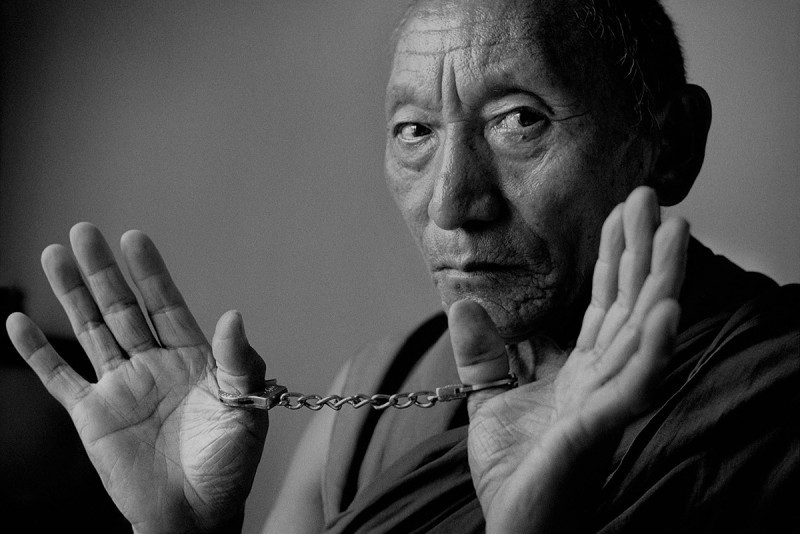peashooter85:Won’t Back Down — The Captivity of Palden Gyatso“The human body can bear immeasurable p
peashooter85:Won’t Back Down — The Captivity of Palden Gyatso“The human body can bear immeasurable pain and yet recover. Wounds can heal. But once the spirit is broken, everything falls apart.”—Palden GyatsoIn 1950 Chinese forces under Mao Tse Tung invaded Tibet, the large mountainous country that is now located in the southwestern corner of China. Against the Chinese Army, the 5,000 strong Tibetan army stood no chance and was swept away within the matter of days. During the initial occupation by the Chinese, for the most part little changed in Tibet. Tibet remained a de facto autonomous region and communist reforms were enacted slowly and incrementally. That all changed in 1959 when the Chinese Communist Party decided it was time to radically change Tibet. Programs were immediately put in place to transform the Tibetan economy along Maoist ideals while severely restricting Tibetan religion and culture. What resulted was a nationwide uprising against the Chinese occupation composed of both peaceful protestors and armed guerillas. The Chinese responded with extreme brutality, causing the deaths of between 80,000 and 90,000 Tibetans. One of China’s goal was to completely gut Tibetan culture, most especially Tibet’s cultural cornerstone, the practice of Tibetan Buddhism. In that year, the Chinese destroyed over 2,000 monasteries, arresting or executing thousands of monks.Palden Gyatso was a 28 year old monk when the Chinese arrested him and destroyed his monastery near Lhasa. For the next 33 years, he was forced to live hellish existence in various Chinese prisons and forced labor camps. Along with his fellow monks, he endured harsh treatments including communist indoctrinations sessions, beatings, torture, and starvation. His captors offered a simple way to escape their tortures; if he merely renounced his religion and his country, he would be set free. He refused. During his 33 year captivity he was fed very little. Often, all he was given to eat was a bowl of soup so thin that he could see his reflection in it. It wasn’t uncommon for his guards to deny him food for days on end. Him and the others monks survived by eating boiled leather, tree bark, leaves, grass, and insects. When Palden Gyatso was finally released, he was described as a walking human skeleton.Worse than the starvation was the torture, which commonly occurred after indoctrination and “re-education” sessions. The guards viciously beat the monks routinely. In one particularly horrific torture, the guards hogtied Gyatso’s hands and feet behind his back, suspended him from the ceiling from a rafter, then slowly dripped boiling water down his back, yet still he refused to give in. In the 1980’s the guards began using cattle prods, jolting them with powerful electric shocks across the body. Often the guards would sadistically tease the monks by pretending to shock them but holding back, only to randomly shock them later. One guard jammed a prod into Palden’s mouth, the blast of which knocked him unconscious. When he awoke, he was lying in a pool of his own bodily fluids and found that he no longer had any teeth. Regardless, he refused to denounce his convictions. Today he wears dentures.In the 1960’s he managed to escape from a labor camp, however a short time later he was arrested for placing “free Tibet” posters on buildings in Lhasa. He was finally freed in 1992 under international pressure, espcially by Amnesty International. Before he departed, Gyatso and the other monks managed to convince the guards to sell them the instruments of torture they used, which he now displays during his speaking tours. Gyatso was smuggled out of Tibet, escaping to Dharmasala, India, now home to the largest community of Tibetan refugees in the world. Shortly after his captivity, he wrote an autobiography detailing his experiences. Today Palden Gyatso travels the world, speaking to audiences about his experiences and advocating for Tibetan rights and freedom. When asked if he hated the guards for what they had done to him, he responds that he holds no ill will against them, rather that he pitys them for being caught up in a system that has stripped them of humanity, and understands that what they did, they did out of ignorance. Gyatso’s most common speaking venues are high schools and universities. His advice to the youth,“Treasure your religious and political freedom. Try to live your lives well. Realize how fortunate you are. Don’t waste your time, be respectful of your time. It behooves you not to waste your opportunities.” -- source link
Tumblr Blog : peashooter85.tumblr.com
